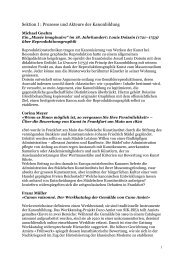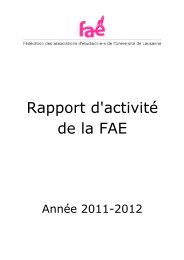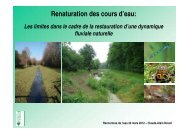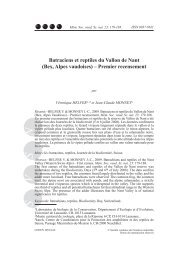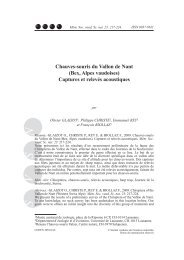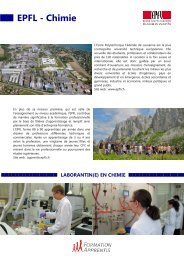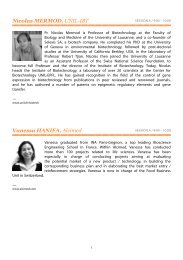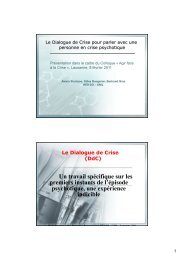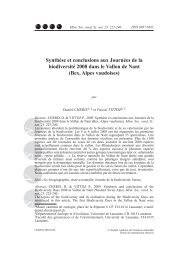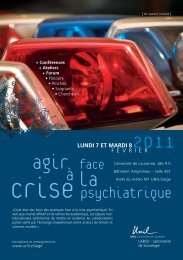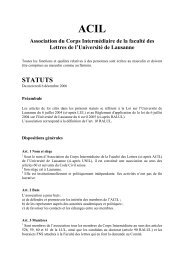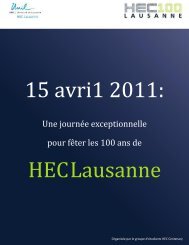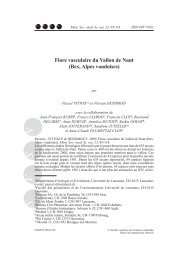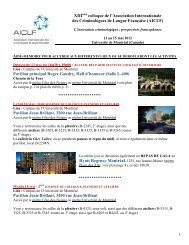Ãvangiles de l'enfance: Infancy Gospels: - Université de Lausanne
Ãvangiles de l'enfance: Infancy Gospels: - Université de Lausanne
Ãvangiles de l'enfance: Infancy Gospels: - Université de Lausanne
Create successful ePaper yourself
Turn your PDF publications into a flip-book with our unique Google optimized e-Paper software.
:: FRIBOURG :: PRÉSENTATION::: Vendredi 03 décembre (début 14 h)Les récits <strong>de</strong> l’enfance dans l’ecclésiologie, la liturgie et l’art: Elian Cuvillier (Montpellier):«Enjeux ecclésiologiques <strong>de</strong> Matthieu 1-2. Approches historique et théologique»«Ecclesiological Challenges in Matthew 1-2. Historical and Theological Approaches»: Daniel Gerber (Strasbourg):«D’une i<strong>de</strong>ntité à l’autre: le Magnificat, le Benedictus, le Gloria et le Nunc dimittisdans le rôle <strong>de</strong> passeurs» / «From One I<strong>de</strong>ntity to the Other: the Magnificat, the Benedictus,the Gloria and the Nunc dimittis as Transmitters»: Luc Devillers (Fribourg):«Enfance <strong>de</strong> Jésus et enfance <strong>de</strong> l’Église. La joie du salut dans les hymnes <strong>de</strong> Lc 1-2 etdans les sommaires d’Ac 1-7» / «Jesus’s Childhood and Church Childhood. The Bliss ofSalvation in Lk 1-2 Hymns and Ac 1-7 Summaries»: Simon Butticaz (<strong>Lausanne</strong>):«Lc 1-2: Prélu<strong>de</strong> d’une récit tragique? L’i<strong>de</strong>ntité chrétienne en dialogue avec Israël»«Lc 1-2: Prelu<strong>de</strong> to a Tragic Account? The Christian I<strong>de</strong>ntity in Dialogue with Israel»::: Samedi 04 décembre (fin 16 h): Ursula Ulrike Kaiser (Hambourg):«Les récits <strong>de</strong> l’enfance et leur réception. Réflexions sur l’utilisation d’une traditionmultiforme» / «<strong>Infancy</strong> <strong>Gospels</strong> and their Reception. Reflexions over the Uses of aManyfol<strong>de</strong>d Tradition»: Jean-Daniel Kaestli (<strong>Lausanne</strong>):«L’étrange témoignage <strong>de</strong> la sage-femme dans le Livre <strong>de</strong> la Nativité du Sauveur(CANT 53)» / «The Strange Testimony of the Midwife in the Book of the Nativity ofthe Saviour»: Isabelle Saint-Martin (Paris):«Les récits <strong>de</strong> l’enfance dans l’art: la place <strong>de</strong>s apocryphes»«<strong>Infancy</strong> Stories in Art: the role of Apocrypha»: Sever J. Voicu (Rome):«Usages communautaires <strong>de</strong>s apocryphes <strong>de</strong> l’enfance»«Community Usages of the <strong>Infancy</strong> Apocrypha».: Benedict Viviano (Fribourg), conclusion:«Dieu comme Père et Mère dans les Evangiles <strong>de</strong> l’enfance»«God as Father and Mother in the <strong>Infancy</strong> <strong>Gospels</strong>»Si les traditions sur la naissance <strong>de</strong> Jésus ont toujours suscitéun grand intérêt dans la culture, l’art et la piété chrétienne,les Evangiles dits «<strong>de</strong> l’enfance» ont été négligés par la recherchemo<strong>de</strong>rne, parce que considérés comme populaires etlégendaires. Ce séminaire <strong>de</strong> recherche se propose <strong>de</strong> reconsidérerles traditions canoniques et apocryphes sur l’enfance<strong>de</strong> Jésus via la thématique <strong>de</strong>s i<strong>de</strong>ntités mises en récits dansces textes, et via la pluralité <strong>de</strong>s lectures (historique, narrative,psychanalytique, féministe, artistique, liturgique, etc).While the traditions concerning the birth of Jesus have alwaysfigured prominently in culture, art and Christian piety, theso-called ‘<strong>Infancy</strong> <strong>Gospels</strong>’ have been somewhat neglected inmo<strong>de</strong>rn research, being viewed as they are as legendary orbelonging to folk literature. The aim of this research seminaris to reconsi<strong>de</strong>r the canonical and apocryphal traditions onthe infancy of Jesus, taking the themes of the i<strong>de</strong>ntity embodiedin the discourses and the multiple ways of reading thetexts (historical, narrative, psychoanalytical, feminist, artistic,liturgical readings, aso).:: RENSEIGNEMENTS PRATIQUESRenseignements pratiques et inscriptions et jusqu’au 30 août 2010:Benjamin Bertho, Anthropole 5022, UNIL, 1015 <strong>Lausanne</strong>;benjamin.bertho@unil.chwww.unil.ch/irsb::: Frais d’inscription (sauf membres CUSO):250 frs pour les trois sessions; session <strong>de</strong> <strong>Lausanne</strong>: 100 frs; sessions <strong>de</strong> Genèveou Fribourg: 75 frs chacune. Les frais d’inscription sont à verser au moment <strong>de</strong>l’inscription sur le compte <strong>de</strong> l’IRSB: CCP 10-22303-0Les textes seront envoyés par courriel aux participants avant chaque session.::: Comité scientifique:C. Clivaz, A. Dettwiler, L. Devillers et E. NorelliProgramme <strong>de</strong> recherche présenté parles Universités <strong>de</strong> <strong>Lausanne</strong>, Genève et Fribourg,AUTOMNE 2010Évangiles <strong>de</strong> l’enfance:<strong>de</strong>s récits aux i<strong>de</strong>ntités,<strong>de</strong>s i<strong>de</strong>ntités aux récits<strong>Infancy</strong> <strong>Gospels</strong>:Stories and I<strong>de</strong>ntities
:: LAUSANNE :: LAUSANNE :: GENÈVE::: Jeudi 30 septembre (début 14 h)Etat <strong>de</strong> la recherche et contexte: Enrico Norelli (Genève)«Les plus anciennes traditions sur la naissance <strong>de</strong> Jésus: état et perspectives <strong>de</strong> la recherche»/ «The Ol<strong>de</strong>st Traditions of Jesus’ Birth: State and Prospects of Research».: Francesca Prescendi (Genève)«Pères divins, mères mortelles et enfants royaux: à propos <strong>de</strong> quelques récits antiqueset <strong>de</strong> leur interprétation dans le Rameau d’or <strong>de</strong> Sir James Frazer»«Divine Fathers, Mortal Mothers, and Royal Children: On Some Ancient Accountsand Their Interpretation in Sir James Frazer’s The Gol<strong>de</strong>n Bough»: Sabrina Inowlocki Meister (<strong>Lausanne</strong>):«Enfances divines dans le judaïsme hellénistique»«Divine Infancies in Hellenistic Judaism»::: Conférence grand public à 18h30 (Anthropole 2064): Régis Burnet (Paris)«Quoi <strong>de</strong> neuf sur les Evangiles <strong>de</strong> l’enfance?»«What’s New On the <strong>Infancy</strong> <strong>Gospels</strong>?»::: Vendredi 01 octobre et Samedi 02 octobre (fin 16 h)Les Evangiles <strong>de</strong> l’enfance ou comment raconter une origine: Loveday Alexan<strong>de</strong>r (Sheffield)«La Madonne et l’enfant: le récit lucanien <strong>de</strong> l’enfance et l’imagination religieuse<strong>de</strong> l’Antiquité» / «Madonna and Child: Luke’s <strong>Infancy</strong> Narrative and the ReligiousImagination of Antiquity»: An<strong>de</strong>rs Runesson (McMaster)«Donner naissance à Jésus à la fin du premier siècle: Matthieu comme sage-femmedans le contexte <strong>de</strong> la colonisation» / «Giving Birth to Jesus in the Late First Century:Matthew as Midwife in the Context of Colonisation»: Ra’anan Boustan (Los Angeles)«Pureté rituelle, conception miraculeuse et limites entre cultures juive et chrétiennedans l’Antiquité tardive» / «Ritual Purity, Miraculous Conception, and the Boundariesof Jewish and Christian Culture in Late Antiquity»: Jörg Frey (Zürich):«Pourquoi Marc et Jean ont-ils pu se passer <strong>de</strong> récits <strong>de</strong> l’enfance?»«Why Could Mark and John Do Without <strong>Infancy</strong> Stories?»: Claire Clivaz (<strong>Lausanne</strong>)«Entre l’annonce à Marie et le prologue johannique: l’Epistula apostolorum» /«Between the Annunciation to Mary and the Johannine Prologue: the Epistula apostolorum»: Moises Mayordomo (Berne)«Une approche intertextuelle <strong>de</strong> Matthieu 1-2»«An Intertextual Approach to Matthew 1-2»En quête <strong>de</strong> la formation <strong>de</strong>s récits <strong>de</strong> l’enfance: Jens Schröter (Berlin)«Luc 1-2 et les Traditions sur Jean le Baptiste»«Luke 1-2 and the Traditions on John the Baptist»: Philipp Alexan<strong>de</strong>r (Manchester)«Jésus et sa mère dans l’anti-Evangile juif (les Toledoth Yeshu)»«Jesus and His Mother in the Jewish Anti-Gospel (the Toledot Yeshu)»: Christophe Guignard (Bâle)«La famille <strong>de</strong> Jésus et sa généalogie selon le témoignage <strong>de</strong> Julius Africanus»«Jesus’s Family and its Genealogy according to Julius Africanus»::: Vendredi 05 novembre (début 14 h)Lectures plurielles <strong>de</strong>s Evangiles <strong>de</strong> l’enfance: Andreas Dettwiler (Genève)«Mt 1-2 et Eugen Drewerman»«Mt 1-2 and Eugen Drewerman»: Andrea Taschl-Erber (Vienne)«Lectures féministes <strong>de</strong>s Evangiles <strong>de</strong> l’enfance»«Feminist Readings of the <strong>Infancy</strong> <strong>Gospels</strong>»: Adriana Destro et Mauro Pesce (Bologne)«La fuite en Egypte: du christianisme primitif à la chrétienté en Egypte»«The Flight into Egypt: from Early Christianity to Christianity in Egypt»: Jean-Clau<strong>de</strong> Basset (<strong>Lausanne</strong>)«Annonce à Maryam et naissance <strong>de</strong> `Isâ dans le Coran et la tradition islamique»«Announciation to Miriam and Birth of `Isâ in Quran and Islamic Traditions»::: Samedi 06 novembre (fin 16 h): Christian Grappe (Strasbourg)«Les évangiles <strong>de</strong> l’enfance et les récits <strong>de</strong> naissance et d’enfance intertestamentaires»«The <strong>Infancy</strong> <strong>Gospels</strong> and the Intertestamentary Birth and <strong>Infancy</strong> Accounts».: Frédéric Amsler (<strong>Lausanne</strong>)«La chair, réalité et image. Quelques réflexions autour <strong>de</strong> Tertullien»«Flesh, Reality and Image. Thinking about Tertullian»: Valentina Calzolari (Genève)«Les Evangiles <strong>de</strong> l’enfance dans la tradition arménienne»«The <strong>Infancy</strong> <strong>Gospels</strong> in the Armenian Tradition»: François Rosset (<strong>Lausanne</strong>)«L’enfant Jésus au siècle <strong>de</strong>s Philosophes»«Jesus’ Child in Philosophers’ Century»



